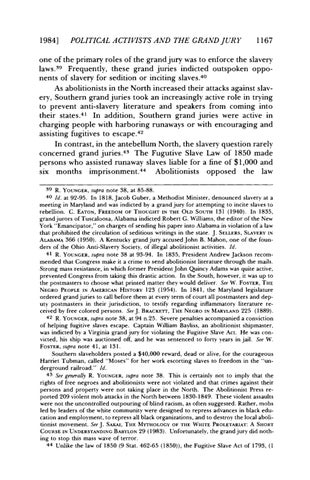1984]
POLITICAL ACTIVISTS AND THE GRAND JURY
1167
one of the primary roles of the grand jury was to enforce the slavery laws. 39 Frequently, these grand juries indicted outspoken opponents of slavery for sedition or inciting slaves. 4o As abolitionists in the North increased their attacks against slavery, Southern grand juries took an increasingly active role in trying to prevent anti-slavery literature and speakers from coming into their states. 41 In addition, Southern grand juries were active in charging people with harboring runaways or with encouraging and assisting fugitives to escape. 42 In contrast, in the antebellum North, the slavery question rarely concerned grand juries. 43 The Fugutive Slave Law of 1850 made persons who assisted runaway slaves liable for a fine of $1,000 and SIX months imprisonment. 44 Abolitionists opposed the law R. YOUNGER, supra note 38, at 85·88. !d. at 92·95. In 1818, Jacob Guber, a Methodist Minister, denounced slavery at a meeting in Maryland and was indicted by a grand jury for attempting to incite slaves to rebellion. C. EATON, FREEDOM OF THOUGHT IN THE OLD SOUTH 131 (1940). In 1835, grandjurors of Tuscaloosa, Alabama indicted Robert G. Williams, the editor of the New York "Emancipator," on charges of sending his paper into Alabama in violation ofa law that prohibited the circulation of seditious writings in the state. J. SELLERS, SLAVERY IN ALABAMA 366 (1950). A Kentucky grand jury accused John B. Mahon, one of the foun· ders of the Ohio Anti·Slavery Society, of illegal abolitionist activities. !d. 41 R. YOUNGER, supra note 38 at 93·94. In 1835, President Andrew Jackson recom· mended that Congress make it a crime to send abolitionist literature through the mails. Strong mass resistance, in which former President John Quincy Adams was quite active, prevented Congress from taking this drastic action. In the South, however, it was up to the postmasters to choose what printed matter they would deliver. See W. FOSTER, THE NEGRO PEOPLE IN AMERICAN HISTORY 123 (1954). In 1841, the Maryland legislature ordered grand juries to call before them at every term of court all postmasters and dep· uty postmasters in their jurisdiction, to testify regarding inflammatory literature re· ceived by free colored persons. See J. BRACKETT, THE NEGRO IN MARYLAND 225 (1889). 42 R. YOUNGER, supra note 38, at 94 n.25. Severe penalties accompanied a conviction of helping fugitive slaves escape. Captain William Bayliss, an abolitionist shipmaster, was indicted by a Virginia grand jury for violating the Fugitive Slave Act. He was con· victed, his ship was auctioned off, and he was sentenced to forty years in jail. See W. FOSTER, supra note 41, at 131. Southern slaveholders posted a $40,000 reward, dead or alive, for the courageous Harriet Tubman, called "Moses" for her work escorting slaves to freedom in the "un· derground railroad." !d. 43 See generally R. YOUNGER, supra note 38. This is certainly not to imply that the rights of free negroes and abolitionists were not violated and that crimes against their persons and property were not taking place in the North. The Abolitionist Press re· ported 209 violent mob attacks in the North between 1830·1849. These violent assaults were not the uncontrolled outpouring of blind racism, as often suggested. Rather, mobs led by leaders of the white community were designed to repress advances in black edu· cation and employment, to repress all black organizations, and to destroy the local aboli· tionist movement. See J. SAKAI, THE MYTHOLOGY OF THE WHITE PROLETARIAT: A SHORT COURSE IN UNDERSTANDING BABYLON 29 (1983). Unfortunately, the grand jury did noth· ing to stop this mass wave of terror. 44 Unlike the law of 1850 (9 Stat. 462·65 (1850», the Fugitive Slave Act of 1793, (1 39 40
